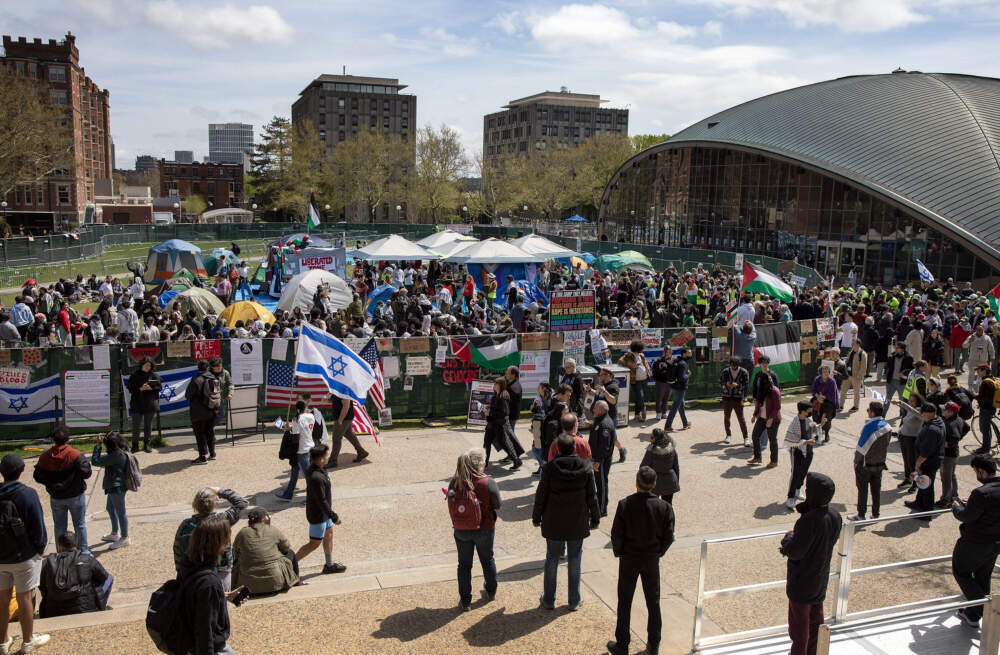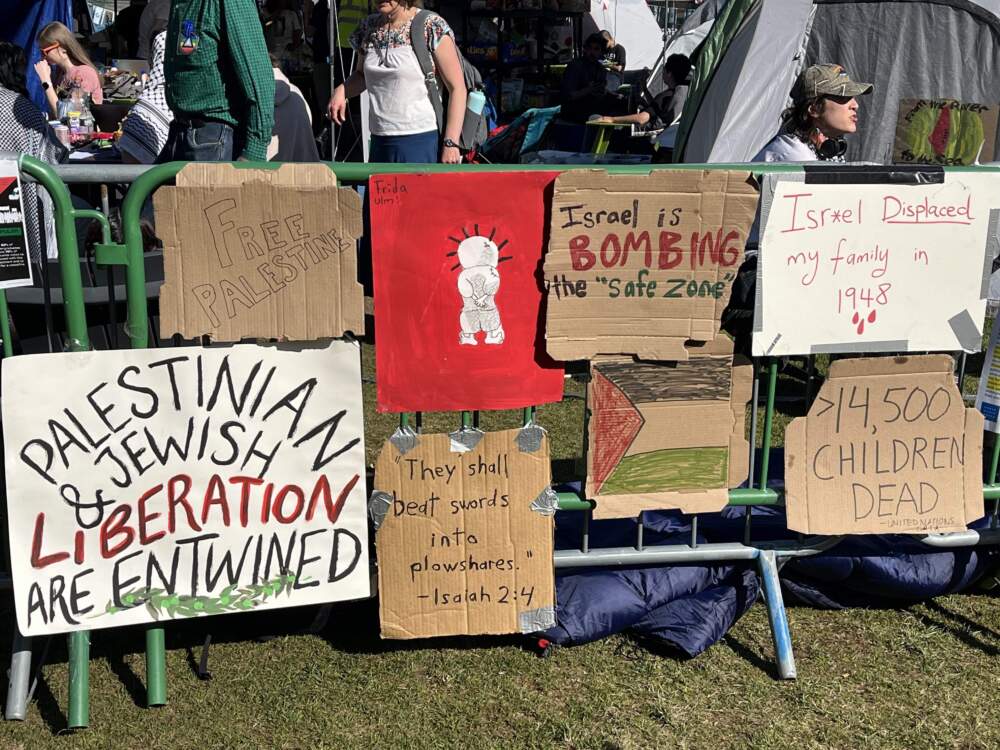Advertisement
Many political leaders paid lip service to protesters' free speech while agreeing with arrests
Resume
When students voluntarily took down their encampment at Harvard University on Tuesday, they closed a chapter of protest not seen on Boston-area college campuses in decades. They did so after watching hundreds of arrests at other schools, including MIT, UMass Amherst, Northeastern University and Emerson College — all while the state's political leaders professed to support free speech, but said little when the police were sent in.
At MIT last week, students marched from their encampment to the school's Stata Center, where they were confronted by campus, city and state law enforcement. Police faced chants of "who do you protect, who do you serve?" before pushing a protestor to the ground and cuffing him. Early the following morning, after days of warnings from the administration that the encampment violated school rules, police broke down a pro-Palestinian encampment on MIT's Kresge Lawn, hauling away tents and signs.
By the end of the two confrontations, 19 students had been arrested. Many also were suspended, including Austin Cole, a third-year graduate student.

"All these things were peaceful protests," Cole said, objecting to MIT's decision to bring in the police.
Cole, who is African American, said he finds it ironic that last year, MIT gave him the Bridge-Builder Award after he traveled to the southern U.S. to study civil disobedience in the civil rights movement. But now, he says, "the university is punishing me and 23 other students for engaging in civil disobedience."
While students like Cole feel punitive responses to campus protests have infringed on their free speech rights, the state's political leaders have largely stuck to a script, citing security concerns or a zero tolerance for speech seen as antisemitic.
"I think it's been appropriate for our college campuses to take the actions that they have taken," Gov. Maura Healey told WCVB's On the Record.
Healey has stayed at arms' length from the protests. According to UMass Amherst, she did not get a heads up before police moved in on students there last week. And while the governor has said she "reveres" students' right to protest and speak out, she's maintained there's a difference between constitutionally protected action and what she called threats or acts of violence.
"What we've seen, unfortunately, on these college campuses are ... actions and behavior that are problematic; that violate the law or violate campus codes," Healey told WCVB.
Healey suggested that people from outside the campuses have sought to exploit the demonstrations and foment violence, though there's been little solid evidence of that on Massachusetts campuses.
At MIT, in a letter to the campus community about the student arrests, President Sally Kornbluth called the police action "a last resort." She said the disruption caused by the encampment was "increasingly untenable," and that protesters had been given ample warning to clear out.
The police actions at Boston-area schools largely have taken place in early morning hours, with less opportunity for public scrutiny. Northeastern, Emerson College and UMass each had around 100 arrests and their encampments cleared by police. At Northeastern and UMass, school officials said they called in police due to issues around safety, violating the institution's rules and messages that could be seen as hate speech against Jewish people or Israelis.
In addition to signs and chants calling for a cease-fire in Gaza, there were others that some found offensive, including use of the phrase "From the river to the sea" and likening Zionists to fascists. At some schools, including Northeastern, administrators alleged a small number of people shouted offensive and hateful things toward Jews.

But students have insisted the majority of the anti-war protesters have been peaceful. At MIT, a counter-protest earlier this month remained calm. In that case, police appeared to help keep tensions in check by setting up metal barricades between the two sides.
At Emerson, things went differently. Boston Mayor Michelle Wu acknowledged sending in the police after the school issuing warnings to students that their tent encampment blocked a public right of way. Some students were hurt in the fracas. The move was met with backlash and Emerson's president has expressed "regret" over the way the clear-out unfolded.
"Even if the universities are complying with the letter of the law in terms of how they call in the police, the question is whether it's good idea to do so," said Carol Rose, executive director of the ACLU of Massachusetts.
Rose said calling in the police to quell campus protests is a bad idea because it almost always escalates tensions. "In addition to chilling peaceful expression and discouraging meaningful dialogue, it actually doesn't necessarily enhance safety," Rose said.
But many political leaders in this deep blue state don't seem to share Rose's concerns.
U.S. Rep. Seth Moulton offered a message similar to Healey's: that free speech and the right to protest are "foundational values." But when protests "cross the line to threatening students, as has been the case at some universities," Moulton said recently on WBUR's Radio Boston, "a lot of Jewish students literally don't feel safe. Then the universities have a right to say, 'This is too much. This has gone too far.' "
U.S. Rep. Lori Trahan has expressed much the same sentiment. Sens. Elizabeth Warren and Ed Markey did not respond to requests from WBUR to talk about this. Meanwhile, U.S. Rep. Jake Auchincloss accused protestors of intimidating Jewish and Israeli students, writing on X that "students should get back to class."
One member of the state's congressional delegation has come out more strongly against arresting student protesters.
U.S. Rep. Jim McGovern, a Worcester Democrat, told New England Public Media in the wake of the UMass crackdown: "I'm a strong believer in the right to peaceful protest. ... And I'm a believer that at this very tenuous and challenging moment, we have to be about listening to one another. We have to be about letting people in rather than shutting people out. But it also means that you don't arrest peaceful protesters."
U.S. Rep. Ayanna Pressley's office sent a statement from late April, saying she has been "a consistent supporter of peaceful student protestors and has condemned the police crackdown on campuses in Massachusetts and across the country."
For much of the state's political leadership, however, it's clear that addressing the campus protests has presented a no-win scenario, full of risk. Stand up for the pro-Palestinian protesters and risk being called antisemitic; or stand up for Jewish students offended by the protesters and fall into the category of squelching speech and angering thousands of young voters, including many voters of color.
Harvey Silverglate, a veteran civil rights attorney, said sending in police to end peaceful demonstrations is a mistake many leaders will come to regret. Silverglate, who lives just a short walk away from the Harvard and MIT campuses, remembers what happened back in 1969, when Harvard president Nathan Pusey moved against anti-Vietnam war protesters at the university.
"Nathan Pusey, who will of course go down in history for his infamous response, called in the state police," Silverglate recalled. "They had a very substantial number of student injuries who were clubbed with police batons."
On that day, as police arrested more than 200 demonstrators, about 75 people, including officers, were injured in a violent confrontation. Silverglate believes the better approach is to simply let a protest run its course. University authorities can close a campus down and let students protest peacefully — until they're ready to stop.
"There are non-violent ways of dealing with this kind of thing," he said. "It just requires some patience."
Unlike in 1969, Harvard did not send in the police this time. Officials closed down access to Harvard Yard, where the protest encampment stood for 20 days. On Tuesday morning, the protestors announced they'd decided to take down their tents — the last students in the Boston area to do so, and less than two weeks before commencement ceremonies are slated to come to the yard.
With reporting from WBUR’s Barbara Moran
This segment aired on May 15, 2024.
